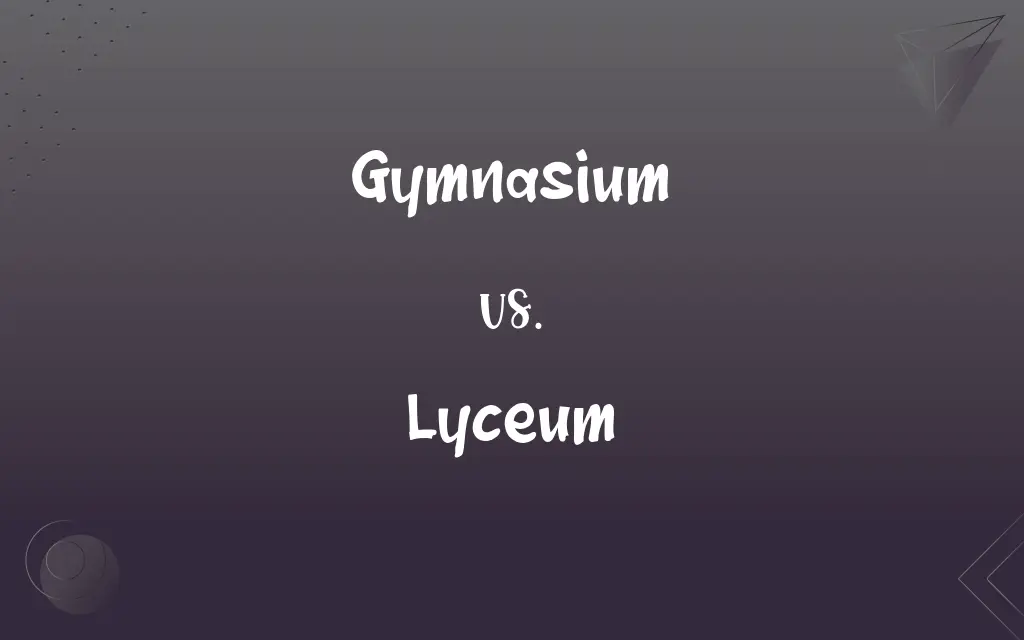Gymnasium vs. Lyceum: What's the Difference?
Edited by Janet White || By Harlon Moss || Updated on November 2, 2023
A gymnasium is a facility equipped for sports and physical exercise, while a lyceum is an institution for education or a venue for public events such as lectures.

Key Differences
A gymnasium is a location designed for physical activity, fitness training, and sports. It is equipped with exercise equipment and often includes courts for basketball or volleyball. Lyceum, historically, refers to a place of learning, originating from Ancient Greece, and is now often used to denote a space where lectures, debates, and concerts are held.
Gymnasiums are primarily focused on promoting physical well-being and health, often through structured classes or personal workouts. A lyceum serves as a cultural hub, emphasizing intellectual development and community engagement through spoken word, performances, and educational gatherings.
In a gymnasium, individuals engage in improving their physical strength, flexibility, and endurance. In contrast, a lyceum is associated with the exercise of the mind, where speakers and teachers enhance knowledge and provoke thought.
Membership in a gymnasium usually entails access to its facilities and services for the purpose of regular exercise. A lyceum might offer memberships or tickets to a series of events as part of educational or cultural programs.
While the term gymnasium can also refer to a type of secondary school in some European countries, it retains its association with physical education. Lyceum rarely refers to a school setting in modern usage but maintains its connection to academic and cultural discourse.
ADVERTISEMENT
Comparison Chart
Primary Function
Physical exercise and sports
Education and public events
Origin
Ancient Greek word for a place of physical training
Named after the location where Aristotle taught
Equipment/Features
Workout machines, weights, sports courts
Auditorium, stage, lecture halls
Activities
Exercise classes, personal fitness training
Lectures, debates, concerts, educational programs
Associated Professions
Fitness trainers, sports coaches
Speakers, educators, performers
ADVERTISEMENT
Gymnasium and Lyceum Definitions
Gymnasium
A hall or building used for indoor sports and exercise.
Our school gymnasium doubles as a venue for assemblies.
Lyceum
A historical term for a venue of philosophical discussion.
Philosophers once debated in the lyceum of Ancient Athens.
Gymnasium
In some European countries, a type of secondary school.
He graduated from the local gymnasium with high honors.
Lyceum
A term used to describe an adult education association.
She took an art history course at the downtown lyceum.
Gymnasium
A room or building where gymnastics takes place.
The gymnasts practiced their routines in the gymnasium.
Lyceum
A place for lectures, concerts, and public gatherings.
The lyceum hosted a series of talks on environmental conservation.
Gymnasium
A place for physical exercise and sports.
She goes to the gymnasium every morning for a workout.
Lyceum
An institution for education or cultural events.
The local lyceum is known for its vibrant guest speaker series.
Gymnasium
A facility with equipment for gymnastics and athletic training.
The new gymnasium is equipped with the latest fitness machines.
Lyceum
A modern venue for performances and community events.
The lyceum is booked for a piano recital next weekend.
Gymnasium
A room or building equipped for indoor sports.
Lyceum
A hall in which public lectures, concerts, and similar programs are presented.
Lyceum
An organization sponsoring public programs and entertainment.
FAQs
Can a lyceum be a school?
Historically, yes, but it's more commonly a place for lectures and cultural events today.
Do gymnasiums offer classes?
Yes, gymnasiums often offer various fitness and exercise classes.
What kind of events happen at a lyceum?
Lectures, debates, concerts, and educational programs typically occur at lyceums.
What is a gymnasium?
A gymnasium is a place designed for sports, physical education, and exercise.
What sports are played in a gymnasium?
Basketball, volleyball, badminton, and gymnastics are common in gymnasiums.
Do lyceums provide formal education?
Not typically; they are more for informal learning and community events.
Can you play team sports in a gymnasium?
Yes, team sports are commonly played in larger gymnasium facilities.
Are gymnasiums open to the public?
Gymnasiums can be public or private, often requiring membership or a fee.
Does a lyceum have a library?
Some might include a library, especially if they are part of an educational institution.
Is a lyceum the same as a university?
No, a lyceum is not a degree-granting institution like a university.
Can anyone speak at a lyceum?
Speakers are usually invited or scheduled by the lyceum's organizers.
Are lyceums found in every city?
Not necessarily; they're more common in cities with a focus on cultural events.
Do gymnasiums focus on all-round fitness?
Yes, they promote various aspects of physical health, from cardio to strength training.
What distinguishes a lyceum from a community center?
A lyceum is traditionally more focused on intellectual and cultural enrichment.
Can a gymnasium also be a venue for competitions?
Yes, many gymnasiums host sports competitions and tournaments.
Is a gymnasium equipment-intensive?
Yes, gymnasiums are equipped with a variety of exercise machines and gear.
Is a lyceum membership expensive?
It varies; some are non-profit and offer reasonable rates or free events.
Are there age restrictions for gymnasium entry?
Some gymnasiums may have age restrictions, especially for using certain equipment.
How does a lyceum differ from a theater?
A lyceum can host a wider range of events, including lectures, not just performances.
Do gymnasiums have personal trainers?
Many gymnasiums offer personal trainers for fitness guidance.
About Author
Written by
Harlon MossHarlon is a seasoned quality moderator and accomplished content writer for Difference Wiki. An alumnus of the prestigious University of California, he earned his degree in Computer Science. Leveraging his academic background, Harlon brings a meticulous and informed perspective to his work, ensuring content accuracy and excellence.
Edited by
Janet WhiteJanet White has been an esteemed writer and blogger for Difference Wiki. Holding a Master's degree in Science and Medical Journalism from the prestigious Boston University, she has consistently demonstrated her expertise and passion for her field. When she's not immersed in her work, Janet relishes her time exercising, delving into a good book, and cherishing moments with friends and family.































































